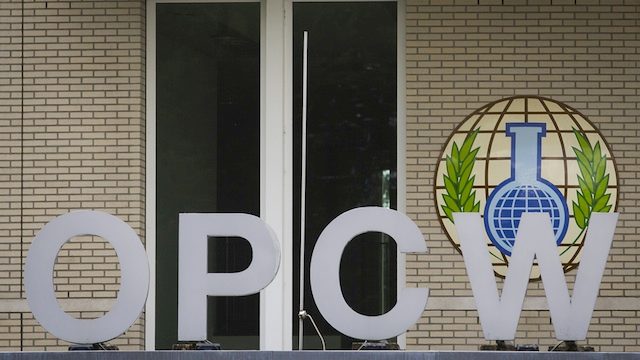SUMMARY
This is AI generated summarization, which may have errors. For context, always refer to the full article.

DAMASCUS, Syria – Around 60 people were killed in Syria’s Damascus and Homs on Tuesday, April 29, as an international watchdog said it would probe alleged chlorine attacks in the country.
Meanwhile, the parliament speaker said four new candidates had registered for next month’s presidential election, expected to return Bashar al-Assad to office despite the civil war, which has left vast swathes of the country out of his control.
A barrage of mortar shells fired by rebels hit a central neighborhood in the capital early Tuesday, killing at least 14 people, state media reported.
The attack hit a school of Islamic jurisprudence where some students are as young as 14, though it was unclear if children were among the dead.
The Syrian Observatory for Human Rights, a Britain-based monitoring group, put the toll at 17, adding that the figure could rise because several of the injured were in critical condition.
Hours later, a car bomb ripped through a crowded area of the country’s third city Homs, followed shortly afterwards by a rocket attack on the same neighborhood, the provincial governor Talal Barazi told Agence France-Presse.
He said 45 people were killed in the double attack on the Zahra neighborhood.
The attack was one of the deadliest to hit the central city, where rebels control just a few remaining districts, most of them under a tight government siege.
Earlier this month, regime forces launched an attack on rebel areas in the city, where just a few hundred opposition fighters remain after most civilians were evacuated in a UN-led operation.
Meanwhile the jihadist Islamic State of Iraq and the Levant announced it had executed seven prisoners in its bastion in northeastern Syria, two of them by crucifixion.
ISIL, which has been disavowed even by Al-Qaeda, said it held the seven responsible for a grenade attack on one of its fighters earlier this month in the Euphrates Valley city of Raqa, which it rules with an iron fist.
The Britain-based Syrian Observatory for Human Rights posted a photograph of the two prisoners being crucified at the roundabout with passer-by walking past apparently unfazed.
Chlorine attacks probe planned
In the Hague, the Organisation for the Prohibition of Chemical Weapons (OPCW) said it would examine allegations that chlorine had been used in attacks in Syria.
The regime and rebels have blamed each other for using chlorine in at least one attack, in the rebel-held town of Kafr Zita in Hama province, with the opposition alleging the government has carried out several more.
Britain’s Daily Telegraph said a team of unnamed experts had found “sizable and unambiguous traces of chlorine and ammonia” in soil samples taken from the sites of three regime helicopter attacks.
It said the findings proved the government was still using chemical agents against civilians.
The OPCW is already in Syria overseeing a deal under which Damascus is to turn over its chemical weapons arsenal by June 30. (READ: Syria chemical handover nearly complete – watchdog)
On Sunday, April 27, the joint UN-OPCW mission in Damascus said 92.5% of the country’s chemical weapons material had been removed or destroyed. (READ: Syria has 8% of chemical material left – monitor)
Syria agreed to dismantle its chemical weapons program last year, after Washington threatened military action in response to a sarin gas attack outside Damascus that killed up to 1,400 people.
The regime denied carrying out the attack.
New presidential candidates
In Damascus, parliamentary speaker Mohamed al-Lahham said four more candidates had registered for the June 3 presidential election, bringing the total number, including Assad, to 11.
Ali Wanous, Azza al-Hallaq, Talea Salah Nasser and Samih Mikhael Moussa are all relative unknowns.
Syria’s constitution requires that candidates be Muslim, but a source in the constitutional court confirmed that Moussa is Christian.
“In the five days after the candidacy period ends, on May 5, we will examine the candidates to see if they meet all requirements. On May 6, we will announce who has met the conditions,” the source said.
Hallaq’s application brings the number of women competing in the vote to two.
The constitution contains no explicit prohibition on female candidates, but its phrasing implies only male candidates are permitted.
The elections will be Syria’s first multi-candidate presidential vote after a constitutional amendment did away with the previous referendum system.
But with a brutal civil war raging and large areas of the country held by rebels, it remains unclear how the vote will be organized.
Nearly half of Syria’s residents have fled their homes, and the electoral commission says those who left the country “illegally” will not be allowed to vote.
Electoral rules also prevent anyone who has lived outside Syria in the past decade from running, effectively excluding most prominent opposition figures, who live in exile. – Rappler.com
Add a comment
How does this make you feel?
There are no comments yet. Add your comment to start the conversation.